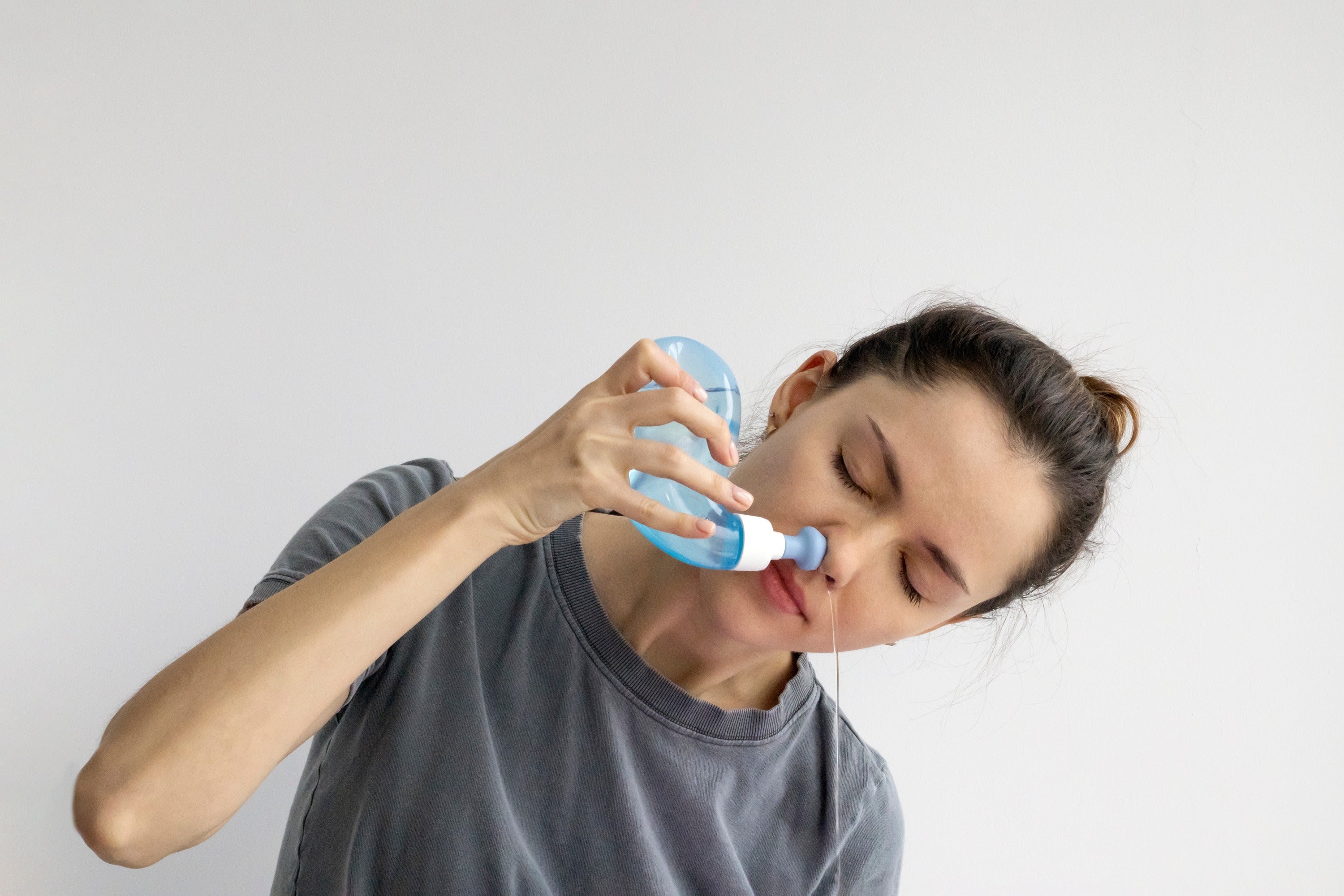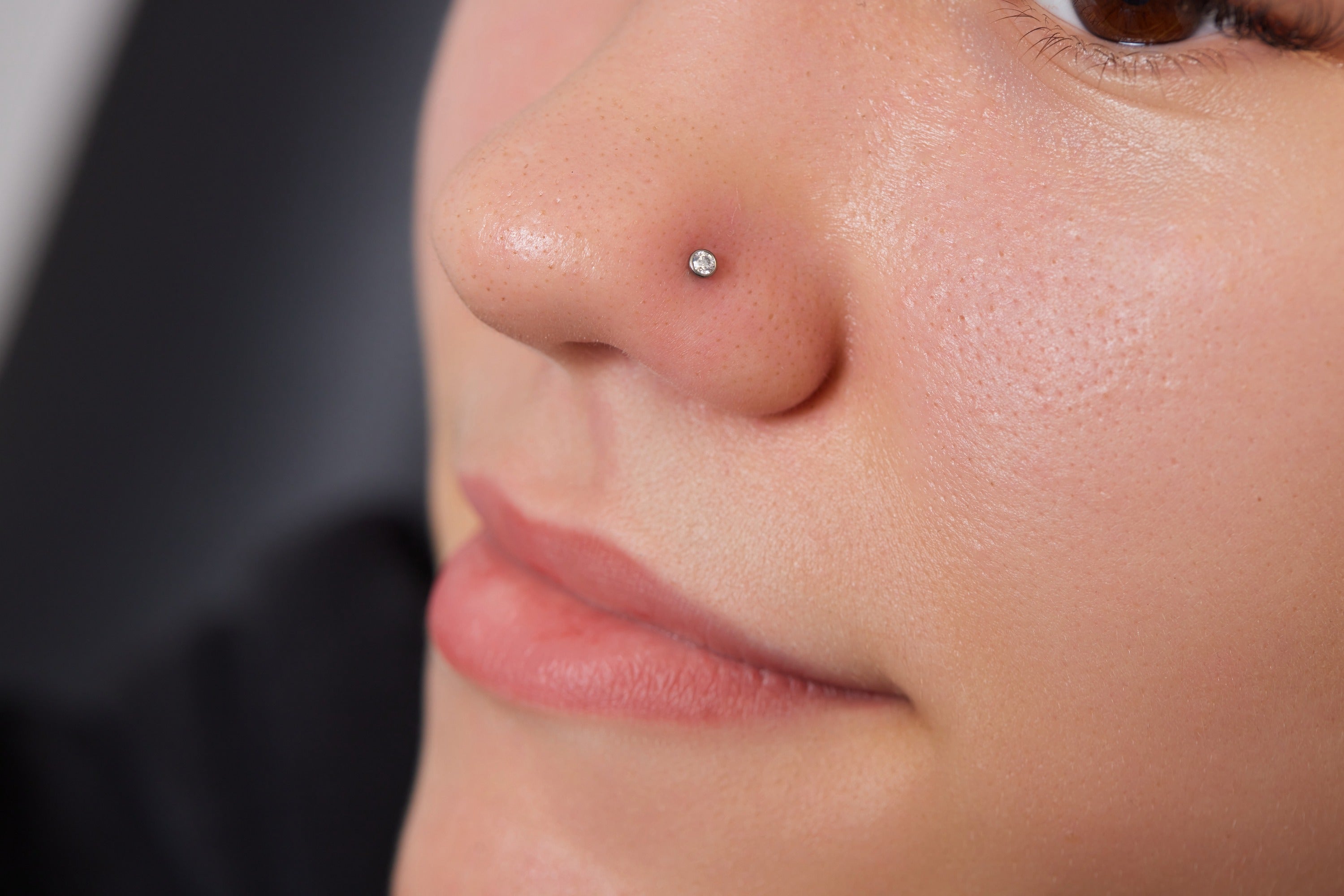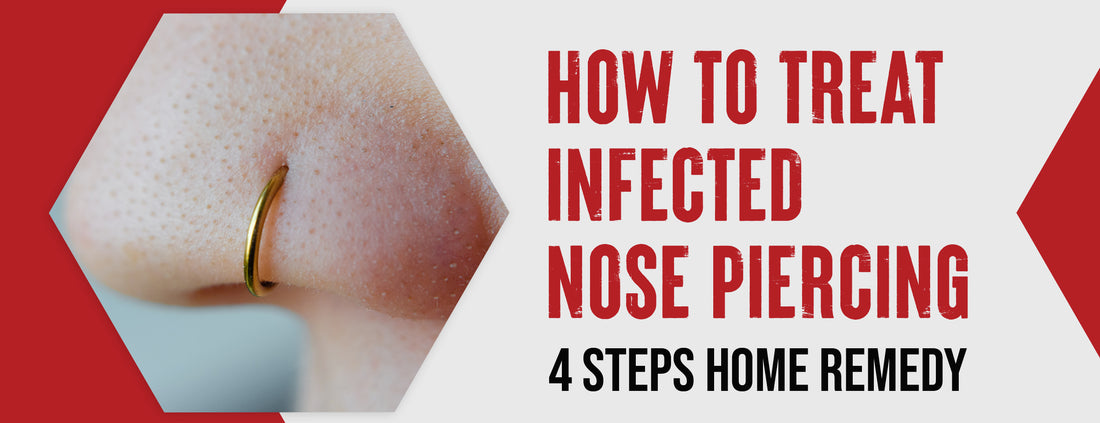An infected nose piercing is characterized by swelling, pain, heat, and redness. The presence of blood or pus, which can be white, green, or yellow, is also an indication. Infections can also cause you to feel hot, shivery, or unwell.
An infected nose piercing can be treated with a warm compress. You can also use over-the-counter or prescription topical antibiotics, like bacitracin or mupirocin. Oral antibiotics such as cephalexin or clindamycin can cover streptococcus and staphylococcus if the infection persists.
In this blog, we will discuss how to treat an infected nose piercing effectively right in the comfort of your home and when to seek professional help. We'll also give you some golden rules for prevention, helping you keep that glint in your nose without the hitches.
How to Treat Infected Nose Piercing: Home Remedy

One of the common issues faced with a nose piercing is infection. You can manage and treat an infected nose piercing right at home with the proper knowledge and care.
Clean an Infected Nose Piercing Step-by-Step
Cleaning an infected piercing is crucial to helping your body heal. Make sure you follow these steps:
- Wash Your Hands: Make sure your hands are thoroughly cleaned. You don't want to add more bacteria to the infection. To scrub, use warm water and antibacterial soap.
- Make a Saline Solution: Next, you'll need a saline solution. All you require is non-iodized sea salt and warm distilled or bottled water. Mix about a quarter teaspoon of the sea salt into a cup of warm water.
- Apply the Saline Solution: Dip a clean cotton ball into the saline solution. Gently press the cotton ball against your piercing, cleaning the area thoroughly. Do this on both the inside and outside of your nose.
- Dry It Out: After you've cleaned the piercing, wipe it dry with a clean cloth. Avoid using anything that could leave behind fibers, like a cotton swab or tissue.
When you wake up and sleep, clean your piercing twice a day. Your body is more likely to fight off infection if you keep the area clean.

Topical Treatments: What Works and What to Avoid
When it comes to topical treatments, it is crucial to know which ones are safe and effective so that healing can be sped up.
- Safe options: Over-the-counter antibiotic ointments can be applied sparingly to the infected area.
- Avoid these: Steer clear of creams and ointments that contain benzocaine, lidocaine, or any numbing agents, as they can harm the healing tissue and exacerbate the infection.
The Dos and Don'ts of Managing an Infection at Home
When managing an infected nose piercing at home, here are some tips to keep in mind:
- Do keep the jewelry in place. Removing it may cause the hole to close up, trapping the infection inside.
- Don't twist or play with your piercing. This can irritate the area and worsen the infection.
- Do seek professional help if your condition worsens or persists after a few days of treatment at home.
It is essential to keep in mind that while these tips may help manage minor infections, severe or persistent conditions should be seen by a medical professional.
Infected Nose Piercing: Tips for Prevention

Prevention is always better than cure, which also holds for nose piercings. To keep your piercing healthy and free from infections, here are some essential tips you should incorporate into your daily routine.
Opting for Superior-Quality Jewelry
One of the first steps towards ensuring a healthy nose piercing is to choose high-quality jewelry. Low-quality or cheap materials can irritate the skin and give rise to infections. Here's how you can make a wise choice:
- You can find hypoallergenic jewelry made from surgical steel, titanium, or 14k gold.
- Avoid materials like nickel or plastic, which can cause allergic reactions in many people.
- Purchase your jewelry from reputable sources to ensure its quality and safety.
Aftercare Guidelines for Piercings
Prevention of infections and promotion of healing requires proper aftercare. Here are some golden rules you should follow:
- Clean your piercing at least twice a day with a saline solution.
- Avoid touching your piercing with dirty hands. Always wash your hands before handling it.
- Wait to remove or change your jewelry until your piercing has completely healed.
- Cleaning agents that are harsh on the skin can irritate and delay healing.

Lifestyle Adjustments for a Healthy Piercing
Your lifestyle habits significantly affect the health of your piercing. To prevent infection in your piercing, follow these tips:
- Healthy eating can boost your immune system and speed up the healing process.
- Keep your bedding clean, as dirty pillowcases can harbor bacteria, leading to infections.
- You should avoid swimming in public pools or hot tubs until your piercing has healed.
- Refrain from applying makeup or skincare products around the piercing area to avoid irritation.
With these preventative measures, your nose piercing will remain healthy and infection-free and look great.
Conclusion
And there you have it! From at-home remedies to knowing when to call a doctor, we've covered all the bases in managing nose-piercing infections. Remember, the quality of your jewelry matters, so make sure to take it seriously. Follow the golden aftercare rules, and consider the lifestyle tips we've shared for infection-free.
The most important thing is to take this seriously. The nose piercing you have is more than just a fashion statement. Be proactive in your piercing care, and don't hesitate to seek professional help. After all, taking good care of your piercing means taking good care of yourself. So, wear your nose piercing proudly and, most importantly, safely.





![The Recovery Time and Stages of Nipple Piercings [Best Practices]](http://drnumb.com/cdn/shop/articles/How_Long_Do_Nipple_Piercings_Take_To_Heal__3_Stages_Explained.jpg?v=1714373243)

